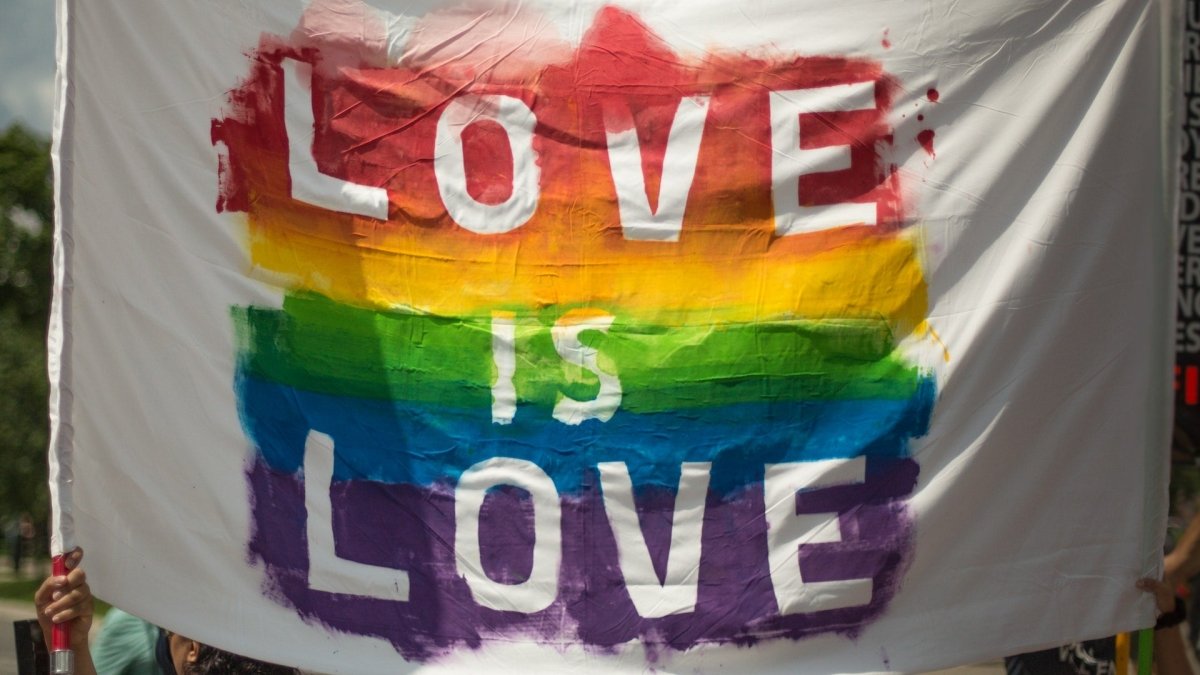Your cart is empty

LGBTQ+ Pride - Be an Ally
It’s been more than 50 years since a police raid on a gay bar, in Greenwich Village, New York was the final straw for groups of marginalised and persecuted people. The Stonewall Riots that followed would inspire generations.
Today, thanks to a relatively small group of freethinking pioneers, Pride events are celebrated annually around the world. Barriers to living an authentic lifestyle are being broken down every day. However, it seems we are trending backwards in the UK and in other parts of the world.
At Sheep in Wolf’s Clothing, we find it disconcerting that we are still dealing with many of the civil rights issues of the late 60s today. With celebrations like London Pride around the corner, we feel it’s as good a time as any for a humbling reminder of what’s at stake.
Some things are more important than beer.
What is Pride?
Early marches for LGBTQ+ rights were known as “Gay Liberation Marches” or “Gay Pride.” Today, most of us know the world-famous event organised around equality simply as “Pride.”
For those of us in relatively free countries, there is likely a Pride event within driving distance. However, this wasn’t always the case. It’s been a five-decades-long struggle to get where we are today (and there’s so much further to go).
Brief History of LGBTQ+ Pride

The Stonewall Riots were a direct result of an ill-conceived police raid on the gay-friendly Stonewall Inn based in Lower Manhattan. However, the spontaneous protests were also a culmination of years of discrimination and suffering.
Although the Stonewall Rebellion was short-lived, lasting from June 28-July 3, 1969, it was only the beginning. By the next summer, organisations such as the Gay Liberation Front and the Gay Activists Alliance helped to form the Christopher Street Liberation Day Committee.
On June 28, 1970, the first Gay Pride march took place simultaneously in New York City, Los Angeles and Chicago. By the following year, more US cities joined the movement as well as London, Paris, West Berlin, and Stockholm.
Despite plenty of resistance, Pride celebrations have spread to many parts of the globe.
Pride in the UK
London Pride (also known as Pride in London) has been held annually since 1972. This year’s event will be held on 1 July 2023 and is expected to have over 600 LGBTQ+ groups participate. The event will cost £1.7 million and features several stops featuring performances and much more.
Other massive Pride events can be found in the following cities:
- Edinburgh June 24
- Bristol July 8
- Brighton August 5-6
- Manchester August 25-28
You can also stop by PrideEvents to find what’s on near you.
Hackney Gladies
Hackney RFC is an inclusive club that features both men’s and women’s teams. The organisation has a familial tie with SiWC. The former captain of the team, MC, is also a very understanding partner of our founder Matty.
When we started Sheep in Wolf’s Clothing, we knew we had to get involved with the club whether it be sponsoring warmup kits, volunteering to coach or providing after-match refreshments.
Hackney Gladies boast a wealth of diversity and strong, interesting people. When talking about the LGBTQ+ community, we thought we’d go straight to the source and get a proper insight into the current situation in the UK and abroad.
Zara

Originally from Enfield in North London, Zara-Louise O’Toole has been playing for Hackney Ladies for over 5 years. Like many on the team, Zara is a member of the LGBTQ+ community. By day, she’s working in energy pushing forward cost-saving and carbon-reducing initiatives. But Zara’s real passion is in making and presenting documentaries on “environmental conservation and geopolitical disasters”.
Zara wants to shine a spotlight specifically on “how women and people in the LGBTQ+ community are impacted by either natural disasters or conflict zones. [It’s] to document how they are disproportionately impacted by those events.”
Speaking of inequality, there wasn’t an exact moment when Zara realised or felt she was ‘different’ and didn’t fit into the hetero-normative view. Growing up with a healthy support group of friends and family, Zara mostly focused on school, sports, and the environment.
During this time, she just gravitated towards people that she ‘got on with’ regardless of gender. Zara recalls “I just [told my mates], ‘I’m going on a date with a girl.’ Because I was in such a safe and happy place, it wasn’t a big deal.”
“For a lot of people in the LGBTQ+ community, coming out is a very harrowing, traumatic experience.” “Once you go out, you can’t go back in.” Zara says that when she tells people she’s going on a date they now ask “What’s their name and not what’s his name?”
Despite a relatively supportive experience growing up, Zara says that here in the UK “we still have a long way to go.”
One recent example comes to her mind, “[I was at] a TEDx talk. It was amazing. Basically, they said that if you are a refugee or a person seeking asylum, and you come to the UK, at the Border Force, if you tick an LGBTQ+ category, there is an additional obstacle. You have a much higher chance for your application to be refused.”
That’s why Zara finds it so refreshing to be part of Hackney Gladies RFC. “Hackney is an extremely inclusive team. We have a range of gender identities, sexual preferences, sexual orientations, and things like that.”
“Obviously straight people play rugby, but Hackney as a team, most of us are in some way, shape, or form part of the LGBT community.”
Zara elaborates on the eye-opening experience of playing for Hackney RFC, “you leave the ‘normal’ world and then you go into what is your normal world.”
“I was lucky enough to be a bridesmaid at MC and Matty's wedding in January. Oh wow. Which is really, really nice. Obviously went up to Scotland, and I was also crowned best man by Matty, but maybe don't put that in.”
“Because I was basically just supplying him with drinks. That was my, interview to being best man.“
When comparing the UK to other places Zara has mixed praise, “In London, it’s like you're called out for being a homophobe more than you're called out for being gay. On the whole, we’ve got a long way to go.”
“It would be great for people not in the community to recognise actually how difficult and draining, [being LGBTQ+] takes a toll on people. If you know someone who is in the LGBTQ+ community, stand up for them, go to pride with them, like text them a nice message being like, ‘ it's all, it's all fine by me.’”
About Pride

When asked what Pride means to her, Zara says states she is “conflicted.”
“[For a month], people (especially straight people), go to talks or they get emails about it and they're almost forced into these meetings at work. Like ‘what is being gay’, which is obviously great. It makes it more of a normal thing. The more you talk about it, the less uncomfortable it becomes.”
“And I really like that we have these pride celebrations around the world. I think pride month is especially important for people who haven't come out yet because you can go on social media and see on the news that people are celebrating [being LGBTQ+].
But the question remains, “Why do LGBTQ+ people only get one month to be supported and celebrated?”
“I was on the bus the other day going past NatWest in Liverpool Street, and they had this massive LGBTQ+ flag out the front. And I was like, so what? What are you doing from July to May? Mm-hmm. Like are you back to being homophobic again?”
Despite misgivings about seasonal support, Zara recommends attending a Pride event near you. “If it's a big one like London, Manchester, Atlanta, or New York, it is one big street party. [Be sure] to where the brightest colours, the most outrageous outfits.”
For Pride, Zara can only use one word: “Fabulous, everyone is fabulous there.” Her sage advice for those attending is to “expect crowds, take water and wear comfy shoes.”
On Beer Things
When comes to craft beer, Zara is a bit of a newcomer. “I'd like to go to the pub and I was with my brother and my dad or whatever, I'd always be like, can I have a sip of your beer? And then it would be disgusting.”
Zara recalls what changed, “My friend Anne and I (who also plays on the rugby team) helped out Matty and MC at this beer festival. I asked Matty for the least ‘beery’ beer and he gave me something like I’d never had before.” It was our Shetland Pony Ale that first pulled back the veil and was the start of Zara’s journey of enjoying a beer. “I now class myself as a beer drinker.”
“I think craft beer is making beer cool. There’s a massive variety of flavours. Craft beer often has those values as both a company and the way that the beer is actually brewed.”
When asked about the state of beer Zara replies “Craft beer seems more inclusive. If you are a woman or LGBTQ+, ask for a taster at the bar and find what beers you like.”
Don’t Assume and Support Ethical Brewers
When asked what SiWC readers can do to foster safe spaces in beer, Zara says, “First off, don't assume. For example, if you’re talking to a female employee at a brewery or event, don’t ask to ‘talk to the brewer.” They very well could be the brewer, the owner or the CEO.“
“The second important thing to do is to look for companies that donate money to charities and causes you believe in. So what LGBTQ+ groups or events does a brewery support? Vote for change with your wallet.”
At Sheep in Wolf’s Clothing Brewery, we couldn’t agree more. Go out and support your local LGBTQ+ communities by attending Pride events and purchasing beer from companies that support inclusivity and diversity.
Make sure to follow Zara for important news on the environment at @zaralouiseotoole.
And watch this space for part two of our article about LGBTQ+ Pride in the UK.
- Choosing a selection results in a full page refresh.


